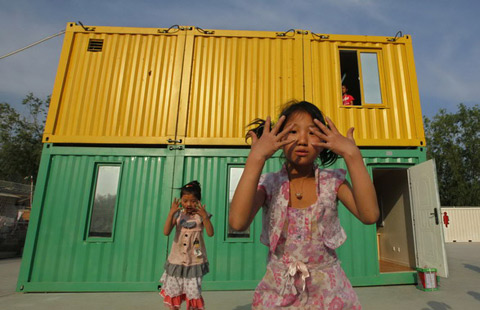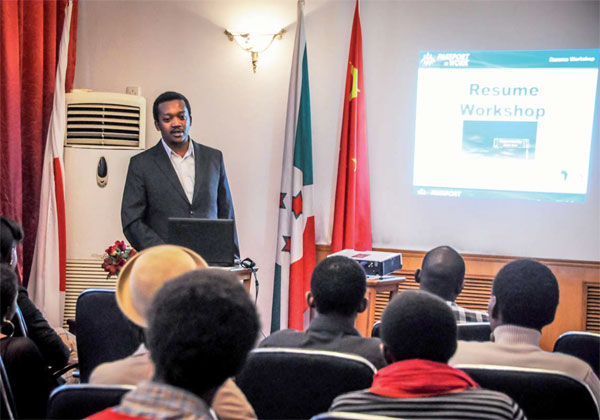Platform for youth
Updated: 2014-04-04 07:47
By Todd Balazovic (China Daily Europe)
|
|||||||||||
|
Norbert Haguma leads a workshop for members of Young African Professionals and Students in Beijing. Provided to China Daily |
Rwandan entrepreneur says Africa will need more specialized workforce in future
Young professionals educated in China are set to fuel the workforce of the most progressive companies in Africa, says Norbert Haguma, founder of the Young African Professionals and Students and the chief executive of Kiziga.com.
With the world looking to Africa as the growth opportunity of the future, the 31-year-old Rwandan has spent the last five years helping connect students in Africa with Chinese universities - ensuring that the specialized workforce required to take the continent forward will be in ready supply.
"Because of the financial crisis and many other reasons, Africa is very appealing right now. Apart from Chinese companies, many Western companies want to hire China-educated Africans," he says.
"It's kind of a unique niche - they can work in Africa and also have the China knowledge.
"It's no longer just Africa and China. It's trilateral. There's a lot of big American and European companies, consultants, financial companies, and architects that are working with Chinese and African companies, seeking well-trained professionals in Africa," Haguma says.
"I decided I was going to start this company and do education and human resources because I thought this was going to be a facilitator and really important to the future of everyone involved."
Launching Kiziga.com in 2009, Haguma decided to leave his high paying investment career and start the education, HR services business after seeing first-hand the need for specialized China knowledge on the African continent.
"During that time I had many potential projects that could have really benefited Africa and the companies involved, but didn't go through because of lack of human resources," he says.
"In one instance, a Chinese company wanted to buy an African bank. It was going to be a $20 million deal, but to help with the project they wanted a local who understood Chinese culture. We couldn't find any. The few we found, who had a degree in banking and at least five years of experience, were asking for exorbitant salaries of over $40,000-$50,000 a month."
He has since developed a network of more than 186 Chinese universities, directly linking African students seeking education opportunities to programs that suit them. His is the first and only online platform, created from scratch, to offer such a service in China.
In China, his work with the YAPS has helped establish a network that helps empower Africans currently undergoing studies.
Responsible for helping host the country's first "Nelson Mandela Day" and promoting African exports in China - in 20011 they worked with African embassies to host a Black Gold event, promoting African coffee in Beijing - Haguma says the most important role YAPS plays is providing support for those who need it.
Sometimes, he says, this comes in the form of helping people find jobs or assisting in job applications by hosting CV building workshops. At other times it comes in the form of something less tangible, but more substantial.
"For example the South Koreans are so well organized in the online forums that when they have a major problem with a program, the next year you will see fewer South Koreans applying to that university. As a result universities are extremely careful about how they treat South Korean students.
"It's becoming the same now through Kiziga and YAPS - when a university mistreats an African or is being unfair to an African student, we rally to support them."
Having spent more than 12 years living in China, Haguma is an entrepreneur who's had his hands in almost every industry before finding his calling facilitating the future of African students in China.
The son of a Rwandan diplomat, he first traveled to China in 1995 at the age of 12, when his father was posted as the ambassador.
During his time in Beijing during the early days of the city's development, he remembers being completely shut out from the "real" China.
"It was a very different China at the time, we didn't interact with the Chinese people at all. The diplomatic community was completely cut off and I didn't have a single Chinese friend," he says.
"By the time we left, I felt that there was something more to China that I wanted to discover and when I finished high school I came right away, on my own this time."
It was the words of his father that spurred him to forego a chance to study in France, where more than 111,000 Africans still study every year, and come to China.
"My father, who has incredible insight, told me in 1994 that the 19th century belonged to Europe, the 20th century to the US, while the 21st century will belong to China. From what I have seen so far, I know he was right," Haguma says.
"I also wanted to maintain the link to my continent and not go to a place where I'd be tempted to settle down permanently, like many other Africans who choose to study in France do. I know for a fact that I will never be Chinese."
Returning in the early 2000s to attend classes at the Beijing Jiatong University for a degree in computer science, Haguma's initial pursuit was to follow in his father's footsteps. Shortly after graduating, he began working for the Rwandan embassy in Beijing, but left after just six months.
"I realized quickly that diplomacy was not my cup of tea," he says.
But his time at the embassy allowed Haguma to take part in the First Forum on China Africa Cooperation. Haguma was a volunteer who worked as a translator on the sidelines of the historic event and was able to mix and mingle with some of Africa and China's well-known entrepreneurs at the time. His fluency in Chinese caught the attention of several businessmen and he began traveling as a translator on business trips between Africa in China, even while pursuing his degree in computer science.
Having seen the potential of trade between China and Africa, he set up the AfrOrient trading company shortly after graduating. Experiencing success over the course of two years, his desire to trade came to a sudden halt after a high volume customer who had committed to purchase a large amount of veterinary equipment, decided to cancel the order after the products were already purchased. It left Haguma without any money and little desire to continue in the trading business.
"I lost all my money in one deal and it changed my mind. I didn't want to do other people's business anymore," he says.
Switching from trade to investment, his first entrepreneurial enterprise was to start a school using his Chinese name Nuo Bei Er, a transliteration of his first name meaning 'Nobel Prize' as the masthead. Experiencing success in his first foray into education, he turned his efforts toward creating a bridge for students from Africa in 2009 by founding YAPS and beginning his work with Kiziga, just as Sino-African trade began experiencing heavy growth.
"The idea was that these relationships were becoming important and that there was a large number of Africans here and we needed to get them organized. It was a matter of getting enough Africans who have the same ideals like mine to come together," he says.
With more than 3,000 members in YAPS, Haguma's efforts have been more than successful.
Now, he has turned his focus from helping Africans find schools to helping them find jobs with Chinese companies, with Kiziga recently undergoing huge renovations to help facilitate the new approach.
But for Haguma, the biggest lesson since moving to China more than a decade ago, has not been how to do business - it's how to be African.
"There is one thing that is clear - China made me African," Haguma says.
"I came here as a Rwandan. For me a Nigerian was as far away as a Pakistani and China made me an African."
toddbalazovic@chinadaily.com.cn
(China Daily European Weekly 04/04/2014 page8)
Today's Top News
Chinese ships continue hunt for MH370 signals
Xinjiang vows to stop extremism
Australia also detects suspicious pulse signal
Afghans vote amid Taliban scare
Hostages taken to Philippine island
Huawei and China Daily inks co-op
Pulse signal discovered
in MH370 hunt area
Challenges in search for MH370 'unprecedented'
Hot Topics
Lunar probe , China growth forecasts, Emission rules get tougher, China seen through 'colored lens', International board,
Editor's Picks

|

|

|

|

|

|






